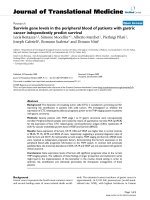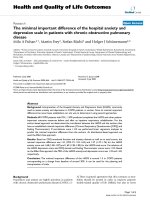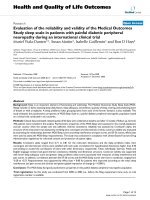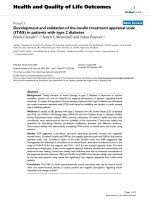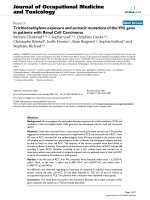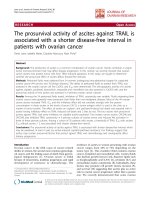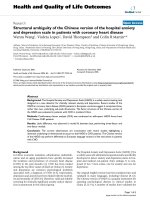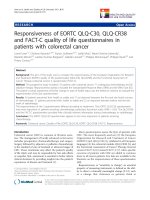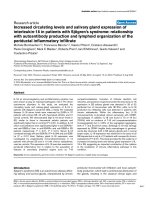Identification of the polymorphism rs4072037 of MUC1 gene in patients with gastric cancer
Bạn đang xem bản rút gọn của tài liệu. Xem và tải ngay bản đầy đủ của tài liệu tại đây (353.8 KB, 7 trang )
JOURNAL OF MEDICAL RESEARCH
IDENTIFICATION OF THE POLYMORPHISM RS4072037 OF
MUC1 GENE IN PATIENTS WITH GASTRIC CANCER
Nguyen Thi Ngoc Lan, Nguyen Van Tan, Ta Thanh Van, Dang Thi Ngoc Dung
Hanoi Medical University
Gastric cancer, a malignant disease, is the fourth most common cancer and second most common
cause of cancer death. The pathogenesis of gastric cancer is a complex process, including Helicobacter
pylori infection, genetic factors as well as many other factors. Among them, Single Nucleotide Polymorphism
(SNP) is one of the most interesting topics nowadays. Few studies on rs4072037 polymorphisms of
the MUC1 gene have been done in different populations, particularly in Asian populations, which have
indicated its role and significance as a susceptibility factor to gastric cancerL. Our objective was to see if
this varitation can be detected in Vietname patients with gastric cancer. Methods: 130 patients diagnosed
of gastric cancer and 130 healthy controls were recruited from the 4 largest hospitals in the North
Vietnam. Genetic polymorphism at rs4072037 was determined by PCR-RFLP. Results: Three types of
SNPs were found as the allele type (G vs A: OR = 0.42, 95% CI: 0.25-0.72), the heterologeneous gene
type (AG vs. AA, OR = 0.47, 95% CI: 0.28-0.77) and dominant gene type (AG + AA vs. GG: OR = 0.67,
95% CI: 0.47-0.97). Conclusions: Allele G of rs4072037 associated with the reduction of gastric cancer risk.
Key words: gastric cancer, polymorphism, rs4072037, MUC1 gene
I. INTRODUCTION
In 2012, there were about 1 million new
to other South- East Asian countries [1]. The
cases of gastric cancer (6.8% of all incident
mortality rates of gastric cancer for both males
cancer cases). As the third leading cause of
and females were also among the highest of
cancer death and the fifth most common cancer
cancers in Vietnam, surpassed only by liver
worldwide, gastric cancer can be considered
cancer and lung cancer [13]. This has been
one of the world’s pressing medical challenges
argued to be attributable to the high prevalence
[2]. More than 70% of gastric cancer cases
of Helicobacter pylori (seen in as much as 75%
occur in developing countries, especially
of Vietnamese adults), in combination with
in East Asia. Vietnam had the highest rate
other risk factors such as smoking, obesity,
compared to other South-East Asian countries
socioeconomic status and genetic factors [8],
In Vietnam, the ASR has been reported to
[16]. A single nucleotide polymorphism, or
be about 16.3 per 100,000 people of both
SNP, is a variation at a single position in a DNA
sexes, which was the highest rate compared
sequence among individuals. One variant gene
is called SNP if more than 1% of a population
Corresponding author: Nguyen Thi Ngoc Lan, Ha-
does not carry the same nucleotide at a specific
noi Medical University
position in the DNA sequence. SNP may occur
Email:
Received: 27/11/2018
Accepted: 12/03/2019
8
within coding or noncoding regions. They
can relate to cancer-causing mechanisms in
JMR 118 E4 (2) - 2019
JOURNAL OF MEDICAL RESEARCH
sporadic cancer and SNPs have a important
significance for community health.
One-hundred
and
thirty
patients
with
gastric cancer were selected by the following
The rs4072037 A > G SNP located in the
criteria: 1) being diagnosed with gastric cancer
5′ UTR of the 2nd exon of MUC1 gene is
(histopathology confirmation); 2) agreeing
predicted to have an effect on the splicing
to participate in the study; 3) being able to
of the primary transcripts, which in turn
communicate with the interviewers. One-
determines the type of variants. The results
hundred and thirty subjects without tumor
of researches demonstrated that the G allele
(controls) were recruited from endoscopy
belongs to variant 2, while the A allele belongs
departments (endoscopy confirmation with
to variant 3. The structural differences between
normal or only benign, acute gastritis). Medical
these two variants lead to insertion/deletion
records of patients and controls were collected
of nine amino acids encoded by the second
under the agreement of the administrative
exon, which are involved in the N-terminal
departments of the 4 hospitals.
signal peptide. This differential signal peptide
2. SNP genotype
may lead to a different function of the encoded
variant protein. Also, the A allele reduces
the transcriptional activity, which may result
in decreased MUC1 expression [7]. The
rs4072037 also influences the transcriptional
activity of the MUC1 gene promoter; the A
allele associated with gastric cancer reduced
the transcriptional activity, which may result in
decreased MUC1 expression [10]. Therefore,
low expression of MUC1 may cause a
reduction in its barrier function in the stomach
and subsequently increases gastric cancer
susceptibility.
The purpose of this study is to find whether
rs4072037 is a risk factor in Vietnamese
patients with gastric cancer.
II. MATERIALS AND METHODS
1. Study subjects
A cross-sectional study was conducted
from May 2016 to May 2018 in four hospitals
in Hanoi, Vietnam, include: National Cancer
Hospital, Hanoi Medical University Hospital,
108 Military Central Hospital, and Viet Duc
Hospital.
JMR 118 E4 (2) - 2019
A 20 – minute interview via telephone or
face-to-face was conducted with each patient,
in which a research questionnaire was used
to
collect
information
socioeconomic
regarding
patient’s
characteristics,
disease
characteristics. The purpose, the benefits,
the drawbacks, and the confidentiality aspect
of patients in the study were introduced to
the patients when they were asked to join the
study. Patients’s consent was ensured prior to
the interview.
Patients were asked to self-report their
information about gender, age, and medical
history.
Blood collection for SNP analysis
2ml peripheral blood was taken from each
patient and put into EDTA tube. All collected
samples were stored in appropriate condition
and transported to the Medical Laboratory
Quality Control – Hanoi Medical University for
gene analysis.
SNP genotypes:
Genomic DNA was
peripheral
blood
using
extracted
from
Exgene™
Blood
9
JOURNAL OF MEDICAL RESEARCH
SV (Gene All, Korea), according to the
perform the repeated assays, and the results
manufacturer’s
PCR-
were 100% concordant.
restriction fragment length polymorphism assay
3. Statistical methods
instructions.
The
was used to detect the SNP rsA4072037G
with the specific forward and reverse primers
5 ’ - A A G G C C TAT G G G C A G A G A G A - 3 ’
and
5’-ACGCTGCTGGTCATACTCAC-3’,
respectively. The 332-bp PCR products were
digested overnight with the restriction enzyme
AlwNI (New England BioLabs, Beverly, MA)
and then separated on 2% agarose gel. The
A allele resulted in 2 fragments of 223 and 109
bp, and the G allele produced 1 fragment of
332 bp.
About 10% samples which without knowing
the subject’s case or control status were
Genotyped by direct sequencing method
base on Sanger principle. Additionally, 10% of
the samples were also randomly selected to
Student’s t-test or chi-square test was used
to evaluate differences in the distributions of
demographic characteristics, selected variables
and genotypes of the rs4072037 between the
cases and controls. The associations between
the 3 genotypes of this SNP and risk of gastric
cancer were estimated by computing the odds
ratios (ORs) and their 95% confidence intervals
(CIs) with unconditional logistic regression
analyses. All the above statistical analyses
were performed with SPSS (v.16.0; IBM SPSS
Statistics).
4. Ethics approval
This study was approved by the Ethics
Council of Hanoi Medical University.
III. RESULTS
Table 1. The socioeconomic characteristics of patients
Case group
Control group
n
%
n
Male
79
60.8
69
53.1
Female
51
39.2
61
46.9
The average age
Mean
SD
Mean
SD
57.2
10.6
56.4
11.5
p
%
Gender
0.21
0.51
Table 1 describes the socioeconomic characteristics of patients. There is no statistically
significant difference in gender between case and control groups (p = 0.21). The mean age of the
case group had no significant difference compared to the control group (p = 0.51)
10
JMR 118 E4 (2) - 2019
JOURNAL OF MEDICAL RESEARCH
Figure 1. Electrophoresis of productions treatedby enzyme AlwNI
M: 100bp ladder; K1 đến K14: Samples of patients with gastric cancer; (+): Positive control and
(-): Negative control
Figure 1 describes electrophoresis results after using PCR-RFLP with K3, K5 samples have
GG genotype (332bp DNA fragment); K4, K7, K8, K11, K12: have AA genotype (223bp and 109bp
DNA fragments); K1, K2, K6, K9, K10, K13 and K14 have AG genotype (332bp, 223bp, 109bp DNA
fragments).
Figure 2. Sequencing results ofDNA fragment containing rs4072037
Figure 2 describes the results of sequencing analysis of K4, K5, K6 samples after PCR-RFLP.
Product bands are clear and easy to determine the genotypes of these patients. The results were
100% concordant.
Table 2. Genotype and allele characteristics of rs4072037
Case
n
p
Control
%
n
%
Genotype
AA
68
52.3
44
33.8
AG
48
36.9
73
56.2
GG
14
10.8
13
10
0.006
Allele
JMR 118 E4 (2) - 2019
11
JOURNAL OF MEDICAL RESEARCH
Case
n
p
Control
%
n
%
A
184
70.8
161
61.9
G
76
29.2
99
38.1
0.033
Table 2 describes genotypes and alleles of rs4072037 between cases and controls. In the
case group, AA genotype has highest rate (52.3%) and was significantly differenent between the
distribution genotypes between cases and controls (p = 0.006). Allele A in case group was higher
than in control group with p = 0.033.
Table3. Gastric cancer risk of genotype and allele of rs4072037
Genotype and allele
Case
Control
OR
95% CI
AG vs AA
48/68
73/44
0.42
0.25 - 0.72*
GG + AG vs AA
62/68
86/44
0.47
0.28 - 0.77*
G vs A
76/184
99/161
0.67
0.47 - 0.97*
*p < 0.05
Unconditional logistic regression analysis revealed that the rs4072037 AG heterozygote was
associated with a significant decrease in the risk of gastric cancer (OR: 0.42, 95% CI: 0.25 – 0.72),
and the rs4072037 GG + AG was associated with a significantly decrease risk (OR: 0.47, 95%CI:
0.28 - 0.77) and the rs4072037 A allele was ascociated with a significantly decreased risk (OR =
0.67, 95%CI: 0.47 - 0.97) (Table 3).
IV. DISCUSSION
In this study, the association of genetic
variants of rs4072037 in MUC1 gene with
gastric cancer susceptibility was found in
130 gastric cancer cases and 130 controls in
Vietnamese population. The results show that
MUC1 rs4072037 G allele was significantly
associated with decreased risk of gastric
cancer. This suggests the rs4072037 SNP can
be considered as a marker for diagnosis and
screening for Vietnamese patients with gastric
cancer risk..
The mean age of the case group was similar
to other research population in Vietnam and
East Asia region. Le Viet Nho et al’s research
(2014) had average age 58.9 ± 13.8, and 59.2
12
± 11.9 in Jeong O et al’s research (2011) [5],
[3]. The gender ratio in our research was 1.55/1
which was lower than the studies conducted
by Trinh Hong Son and Wanebo (1.75/1) [14],
[15].
In the case group, the rate of AA, AG and
GG genotypes was as 52.31%, 36.92% and
10.77%, respectively. In control group, the
highest rate was the AG genotype with 56.15%,
followed by AA and GG with 33.85% and
10%, respectively. There was a stastistically
significant difference between genotype
distributions between these groups. Genotype
distribution in our research was similar to other
researches such as Hye-Rim Song (2014),
JMR 118 E4 (2) - 2019
JOURNAL OF MEDICAL RESEARCH
Hanze Zhang et al (2011), AA genotype was
the most common genotype in research
population 79.2% and 74.2%, respectively,
less common were AG genotype 19.1% and
23%, respectively [12], [17]. The genotype
rate in control group was similar to research
of Yanbin Jia et al (2010). Both groups have
AG genotype with highest common rate, up to
51.6% [4]. Our results show that rs4072037
G allele leads to reduce gastric cancer in the
allele type (G vs A: OR = 0.42, 95% CI: 0.25
- 0.72), in the heterologous gene type (AG
vs. AA, OR = 0.47, 95% CI: 0.28 - 0.77), in
dominant gene type (AG + AA vs. GG: OR =
in the stomach, and subsequent increases in
gastric cancer susceptibility.
This strongly demonstrated rs4072037 G
allele was a protective factor in gastric cancer.
These findings suggested that this SNP may
be used as biomarker to screen Vietnamese
patients with gastric cancer risk.
V. CONCLUSION
The SNP rs4072037 G allele has a
significant association with reduced risk of
gastric cancer and this SNP may be used as
biomarker to screen Vietnamese patients with
gastric cancer risk.
0.67, 95% CI: 0.47 - 0.97). These results were
Acknowledgments
similar to the results of research groups from
This research is funded by Vietnam National
Foundation for Science and Technology
Development (NAFOSTED) under grant
number 106-YS.02-2015.37.
We wish to thank clinicians from National
Cancer Hospital, Hanoi Medical University
Hospital, 108 Military Central Hospital, and Viet
Duc Hospital for their excellent assistance in
recruitment of patients.
We thank scientists and technichians of
Biochemistry Department and Quality Control
Center for Medical Laboratory at Hanoi Medical
University for their support during the research.
Japan, Korea and China with OR arrange from
0.26 - 0.69 [9], [17], [6].
As we know, MUC1 is a member of mucin
family and is a transmembrane mucin. It is a
multi-functional protein involved in mucosal
lubrication, protection from pathogens, signal
transduction and cell-cell interaction. MUC1
was considered as oncogene because it has
role in cell growth, anchorage independence,
cell migration, anti-apoptosis and drug
resistance of cancer cells [10], [11].
The rs4072037 A > G SNP effects on
the splicing of the primary transcripts and
determines the type of variants. The G allele
of this SNP determines variant 2, while the
A allele belong to variant 3. Two variants
differences about nine amino acids encoded
by the second exon and lead to a different
function of the encoded variant protein. Also,
the A allele reduces the transcriptional activity
and decreased MUC1 expression [7]. The
rs4072037 A allele associated with gastric
cancer reduced the transcriptional activity of the
gene product, which may result in decreased
MUC1 expression, reduction in barrier function
JMR 118 E4 (2) - 2019
REFERENCES
1. Binh TT, Tuan VP, Dung HDQ, et al.
(2017), “Advanced non-cardia gastric cancer
and Helicobacter pylori infection in Vietnam”,
Gut Pathog, 9, 46.
2. Bray F, Ferlay J, Soerjomataram I,
et al. (2018), “Global cancer statistics 2018:
GLOBOCAN estimates of incidence and
mortality worldwide for 36 cancers in 185
countries”, CA Cancer J Clin.
3.
Jeong
O,Park
YK
(2011),
“Clinicopathological features and surgical
13
JOURNAL OF MEDICAL RESEARCH
treatment of gastric cancer in South Korea: the
results of 2009 nationwide survey on surgically
treated gastric cancer patients”, J Gastric
Cancer, 11 (2), 69 -77.
4. Jia Y., Persson C., Hou L., et al.
(2010), “A comprehensive analysis of common
genetic variation in MUC1, MUC5AC, MUC6
genes and risk of stomach cancer”, Cancer
Causes Control, 21 (2), 313 - 321.
5. Lê Viết Nho (2014), Nghiên cứu sự
biểu lộ của EGFR, HER2 và mối liên quan với
lâm sàng, nội soi, mô bệnh học ở bệnh nhân
ung thư biểu mô dạ dày, Nội tiêu hóa.
6. Li M, Huang L, Qiu H, et al. (2013),
“Helicobacter pylori infection synergizes with
three inflammation-related genetic variants in
the GWASs to increase risk of gastric cancer
in a Chinese population”, PLoS One, 8(9),
e74976.
7. Ng W, Loh AXW, Teixeira AS, et al.
(2008), “Genetic regulation of MUC1 alternative
splicing in human tissues”, British journal of
cancer, 99 (6), 978 - 985.
8. Ngoan le T, Lua NT, and Hang LT
(2007), “Cancer mortality pattern in Viet Nam”,
Asian Pac J Cancer Prev, 8 (4), 535 - 538.
9. Saeki N ea (2011), “A functional
single nucleotide polymorphism in mucin 1, at
chromosome 1q22, determines susceptibility to
diffuse-type gastric cancer”, Gastroenterology,
140(3), 892 - 902.
10. Saeki N, Saito A, Choi IJ, et al. (2011),
14
“A functional single nucleotide polymorphism
in mucin 1, at chromosome 1q22, determines
susceptibility to diffuse-type gastric cancer”,
Gastroenterology, 140(3), 892 - 902.
11. Saeki N, Sakamoto H, and Yoshida
T (2014), “Mucin 1 gene (MUC1) and gastriccancer susceptibility”, International journal of
molecular sciences, 15 (5), 7958 - 7973.
12. Song H.R., Kim H.N., Kweon S.S., et
al. (2014), “Common genetic variants at 1q22
and 10q23 and gastric cancer susceptibility in
a Korean population”, Tumour Biology, 35 (4),
3133 – 3137.
13. Tran TV, Pham AT, Dao TV, et al.
(2017), “Cancer Control in Vietnam: Where are
we?”, Cancer Control.
14. Trịnh Hồng Sơn,Đỗ Đức Vân (1997),
“Đặc điểm di căn hạch bạch huyết trong ung
thư dạ dày”, Y học thực hành, 11, 11 - 15.
15. Wanebo H.J., Kennedy B.J., Chmiel
J., et al. (1993), “Cancer of the stomach: a
patient care study by the American College of
Surgeons”, Annals of Surgery, 218, 583 - 592.
16. Zali H, Rezaei-Tavirani M, and Azodi
M (2011), “Gastric cancer: prevention, risk
factors and treatment”, Gastroenterol Hepatol
Bed Bench, 4 (4), 175 - 185.
17.Zhang H.,Jin G. (2011), “Genetic
variants at 1q22 and 10q23 reproducibly
associated with gastric cancer susceptibility in
a Chinese population”, Carcinogenesis 2011,
32, 848 - 852.
JMR 118 E4 (2) - 2019
